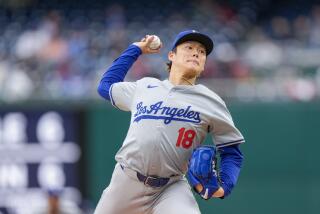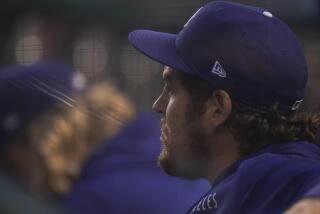Speaking Volumes
There’s a lull, one of those countless moments in a baseball game when a radio listener is taken to the stadium by the restlessness of the crowd and the low hum of static on the AM dial.
The scent of Dodger Dogs on the grill wafts through your mind as you fill out the mental scorecard when your wandering thoughts are brought back by Jaime Jarrin’s soothing and reassuring voice.
“Bueno, y Fernando, ¿como le bato muchacho?” Jarrin asks. “¿Como te bato Junior? ¿Como esta haciendo? ¿Como le va?”
Jarrin is asking his broadcast partner, Fernando Valenzuela -- yes, that Fernando Valenzuela -- about his son’s latest exploits. How is he hitting? How is he doing? How are things going for him?
The uncomfortable silence returns.
“Pues,” Valenzuela says with an unsure pause. “Bueno, es que, uh
It doesn’t take a Spanish-English dictionary to tell that he is out of his element. But then Valenzuela catches himself. This is, after all, his job as a color commentator for the Dodgers’ Spanish-language broadcasts on KWKW, 1330 AM.
Valenzuela, who protected his privacy as a player as fiercely as he did a one-run lead, seems to beam as he relents and then regales listeners with tales of Fernando Jr., a former college standout at Nevada Las Vegas who is now playing minor league ball for the San Diego Padres’ Class-A affiliate at Fort Wayne, Ind.
And although there still are times Jarrin has to figuratively pull teeth to get Valenzuela to open up, those instances are becoming fewer and fewer.
“It depends on how you feel,” Valenzuela said. “If I feel good, I’m going to say more. This year, I’m more relaxed. I’ve learned a little bit, little things -- when to start talking, when to pass the microphone to the play-by-play guys.”
As any former player who makes the transition to radio color man will tell you, his forte is supposed to be analyzing game situations and Valenzuela has had to be nudged to go back to the days when he looked to the heavens during his windup.
“It’s the same thing, you have to be watching the game,” he said. “How the defense and the infielders and outfielders are playing, if they’re playing him to pull or whatever. Little things.
“It’s just being more comfortable, having more practice, feeling more free to say what I want. Last year, I wasn’t comfortable. I was afraid I’d say the bad words.”
Valenzuela’s return last June to the organization that he seemed to have purposely distanced himself from after he was unceremoniously dumped was hailed as a move that was not only genius marketing but also one that was just.
“Regresa a la familia el hijo prodigo,” Jarrin said when Valenzuela’s hiring was announced. The prodigal son returns to the family.
The hiring -- Valenzuela works with Hall of Famer Jarrin in the second and third innings, with Pepe Yniguez in the fourth and fifth innings and with Jarrin again in the sixth and seventh innings -- also drew stifled apprehension from several Spanish-language media outlets.
After all, Valenzuela, the impetus for Fernandomania, the cultural phenomenon that transformed Dodger Stadium into a Cinco de Mayo fiesta every time he pitched, is revered by Dodger fans.
And it has not been a smooth transition for Valenzuela, who works all home games and makes some West Coast trips. He often stumbles, looking to find his niche.
“It’s not his fault, he’s not a broadcaster,” said Ruben Valentin of Fox Sports SAP. “They don’t help him. He needs help. He knows the game. He needs to learn to express himself.
“They just ask him questions ... he needs to pick up the necessary lingo.”
Felo Ramirez of Fox Sports Espanol and Fox Sports SAP said Valenzuela would best be served by taking a seminar or class on broadcasting, after which it would be fair to judge him, “in three or four years.”
“It’s good for the Dodgers but he needs more training, more time, more experience in this moment.”
Jarrin labeled Valenzuela as “100% improved,” though Valenzuela is the first to admit that he has struggled.
“I need to be more secure,” he said. “If I want to say something, I should be strong, that’s the way it is. Sometimes I say a lot of, ‘Well, see, uh, maybe.’ I need to say more.
“When I was playing, I was scared to talk. It was not my first choice to be in front of a microphone. But now, I kind of like it.”
Enough that he signed a contract to stay in the broadcast booth through next season and recently added a morning call-in question-and-answer segment with fans on Tuesdays at 8:30 on KWKW.
Jose Mota, the Angels’ Spanish-radio color man who is considered one of the best in the business, said Valenzuela’s mere presence in the booth was a boon to the industry.
“He transcended when baseball really needed a Hispanic, a Mexican hero,” said Mota, whose father is longtime Dodger coach Manny Mota. “This guy brought out the grass roots.
“I remember listening to him last year and he talked about Wilson Alvarez and what he would do in certain situations, ‘My catcher would ask me to do this and ask me to change signs.’ I thought it was great. It put a different perspective on the game.”
Valenzuela had another story, one that had his catcher, Mike Scioscia, in a mound conference, telling him he was done for the day.
“He said, ‘You know, you’ve thrown a lot of pitches now. I think it’s time to bring in another pitcher,’ ” Valenzuela said. “I remember I told him, ‘Yeah, Mike, how many hits you have? None? OK, you’re tired too so you better put somebody in to take your place.’
“He said, ‘You’re crazy,’ and he went back to catch.”
Those are the types of pearls that Valenzuela needs to impart to his listeners, not only to offer insight but to showcase his dry-humor personality and keep the critics at bay.
That way, callers won’t tell him that he sounds as if he’s not having any fun broadcasting, as happened on a recent Tuesday.
“Oh yeah,” Valenzuela said. “That happens.”
Mota has also heard the criticisms of his broadcasting contemporary.
“He’s adapting to a style,” Mota said. “And Freddy didn’t say a whole lot. Even as a player in interviews, Freddy was real brief.”
So then it should be no real surprise that seconds of silence sometimes invade the airwaves when he is in the booth.
What could be considered as baffling as his screwball, however, is how beloved he still is among Dodger fans, 23 years after leading the Dodgers to the 1981 World Series while winning both the Cy Young and rookie-of-the-year awards. The fans don’t care how he sounds; they’re just happy he’s back in the Dodger fold.
Consider: Comedian George Lopez does a dipped-in-truth bit in which he talks of how stereotypical Latinos often turn on their brethren when one succeeds.
According to Jarrin, who has been with Valenzuela from the beginning as his interpreter, there has been no such dynamic.
“The Latinos love him and the Anglos love him,” said Jarrin, who has been broadcasting Dodger games in Spanish since 1959. “Not only that, the Anglos love him more than the Latinos. But the Mexicans are really very proud of him.”
It wasn’t so long ago that his fans wondered if Valenzuela would ever return to Chavez Ravine. After Valenzuela’s 1997 retirement, then-Dodger owner Peter O’Malley worked on Jarrin.
Said Jarrin, “Mr. O’Malley used to tell me, ‘Jaime, please get him back under any conditions. Please tell him he can choose his workdays and his schedule to do whatever he wants to do except being in uniform with the major league club. If he wants to be a coach or an instructor, whatever, get involved with the community. Anything he wants, I want him back.’
“He didn’t want it. But through his wife Linda, we brought him back and I think that was the right thing to do.”
By then, Fox owned the Dodgers and it was Derrick Hall, former vice president of communications, who made the late run at Valenzuela, even as Jarrin feared the worst.
“I was afraid, especially with the Angels and their new owner [Arte Moreno] and Fernando’s relationship with Mike Scioscia, I thought probably he would go there,” Jarrin said. “That would have been a slap in the face to the Dodgers, my goodness. Fernando going with the Angels? Forget it.”
Valenzuela purses his lips, tilts his head and attempts to convince that he was not angry at the Dodgers for dumping him so late in 1991 spring training, which made catching on with another team tough.
He also giggles at the uproar caused this spring when the new Dodger ownership sent him a coach ticket, rather than first class, for his trip to Vero Beach, Fla., for spring training.
“Being back, it feels good because a lot of people, they talk about I don’t like the Dodgers, I don’t like this, I don’t like that. It’s not the reason I was out,” Valenzuela said. “When I finished in ‘97, that’s what I wanted to do. I wanted to stay home. I wanted to spend time with my family, my kids.
“This job now, this is what I want to do. I’m having fun because I wanted to be with the team and the fans but I didn’t want to travel. It lets me know the people still remember. I was a little nervous coming back. I didn’t know what the people would think.”
The bonus, then, for both Valenzuela and his fans is the event he conducts at Dodger Stadium once a month.
With Amigos de Fernando, 34 children (marking his old uniform number) are invited to a game and he signs autographs for and takes pictures with the wide-eyed youngsters on the field during batting practice.
“That’s the most satisfaction, to see them happy,” Valenzuela said. “L.A. has done a lot for me and now it’s my turn to give back.”
Apparently, he’s found his comfort zone.
More to Read
Are you a true-blue fan?
Get our Dodgers Dugout newsletter for insights, news and much more.
You may occasionally receive promotional content from the Los Angeles Times.






